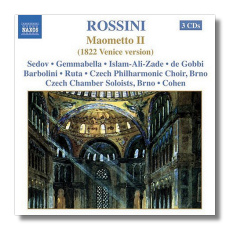
The Internet's Premier Classical Music Source
Related Links
- Rossini Reviews
- Latest Reviews
- More Reviews
-
By Composer
-
Collections
DVD & Blu-ray
Books
Concert Reviews
Articles/Interviews
Software
Audio
Search Amazon
Recommended Links
Site News
 CD Review
CD Review
Gioachino Rossini

Maometto II
(1822 Venice Version)
- Denis Sedov (Maometto)
- Anna-Rita Gemmabella (Calbo)
- Luisa Islam-Ali-Zade (Anna Erisso)
- Massimiliano Barbolini (Paolo Erisso)
Czech Philharmonic Choir, Brno
Czech Chamber Soloists, Brno/Brad Cohen
Naxos 8.660149-51 DDD 3CDs: 71:58, 26:12, 68:30
This intriguing opera was recorded quite satisfactorily in 1983, with Samuel Ramey, Margarita Zimmermann, June Anderson, and Ernesto Palacio in the roles indicated above, respectively. That recording was reissued in 2004 as part of Universal's "Trio" series (475509-2 Amazon - UK - Germany - Canada - France - Japan ), and so it is similar in cost to the Naxos recording under review. What do Cohen and company have to offer?
Well, the Philips recording is based on a version of the opera heard in Naples in 1820. Two years later, Rossini revised it – in the case of the second act, drastically – for a Venetian audience. It is that version which has been recorded here, and for the first time. Not only was music added and taken away, the end of the opera was changed from tragedy to triumph. (In Naples, Anna, the daughter of the Paolo Erisso, the Venetian governor of Negroponte, stabs herself, rather than submit to Maometto (Mahomet), the invading Turk who loves her. In Venice, the Venetian soldiers triumph over the Turks (!) and Anna is happily reunited with her father and her beloved Calbo, a general. At this point, she sings a finale taken from another Rossini opera, La donna del lago, which should give you an indication as to just how much the Venice and Naples versions differ!) Actually, it doesn't stop there, because Rossini overhauled Maometto II yet again in 1826 for Paris; La siege de Corinthe was the result.
Rossini understood what his audiences wanted, and also was receptive to the strengths and limitations of his singers. The Venice version is somewhat shorter than what was heard in Naples, and some of the music (for example, Calbo's big act II solo, "Non temer: d'un basso affetto") has been slightly simplified. A wonderful trio from Naples, "In questi estremi instanti" is missing here. This begs the question, why would anyone want to hear a somewhat mangled version of this opera?
The answer is in the performances. Three of the leads are remarkable young singers, and we will be hearing more from them in the coming years, I hope. Sedov, a young Israeli of Russian extraction, has a characterful voice – not unlike Ramey's, come to think of it – and he negotiates Rossini's florid music with aplomb. Gemmabella is a fantastic alto in the manner of Eva Podles, and she brings down the house, rightfully so, in her aforementioned scene. Calbo is a trouser role, and her voice's timbre suits the young general perfectly. Again, she is superb Rossini stylist, and I look forward to hearing her in more roles. Last but not least, Islam-Ali-Zade brings pathos and warmth to Anna, and she fittingly gets more or less the last word with her brilliant rondo finale. The only black mark is Barbolini, whose Paolo is strained and quite unpleasant whenever he goes above the stave. (Just because Paolo is a father doesn't mean he has to sound like an old man!) The choir sings with refinement – and curiously, with not much vibrato – and the smallish orchestra is game and accomplished. Brad Cohen is an Australian conductor who has conducted a number of Rossini operas at the "Rossini in Wildbad" Festival, which is where this live recording was made in July 2002. The audience is enthusiastic, and the engineering, as is often the case with live recordings, is splendid, with exciting range and impact.
The booklet does not contain a libretto (neither does the "Trio" release), but Naxos invites you to their website to download one. Fair enough – for a recording as enjoyable as this one, I will make that sacrifice!
Copyright © 2005, Raymond Tuttle



















